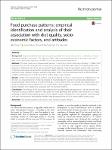Food purchase patterns: empirical identification and analysis of their association with diet quality, socio-economic factors, and attitudes
Thiele, Silke
Peltner, Jonas
Richter, Almut
Mensink, Gert
Background: Empirically derived food purchase patterns provide information about which combinations of foods were purchased from households. The objective of this study was to identify what kinds of patterns exist, which level of diet quality they represent and which factors are associated with the patterns. Methods The study made use of representative German consumption data in which approximately 12 million food purchases from 13,125 households are recorded. In accordance with healthy diet criteria the food purchases were assigned to 18 food groups of the German Food Pyramid. Based on these groups a factor analysis with a principal component technique was applied to identify food patterns. For these patterns nutrient and energy densities were examined. Using regression analysis, associations between pattern scores and socio-economic as well as attitude variables, reflecting personal statements about healthy eating, were analyzed. Results: In total, three food purchase patterns could be identified: a natural, a processed and a traditional one. The first one was characterized by a higher purchasing of natural foods, the second by an increased purchasing of processed foods and the third by a meat-oriented diet. In each pattern there were specific diet quality criteria that could be improved whereas others were in line with actual dietary guidelines. In addition to socio-demographic factors, attitudes were significantly associated with the purchase patterns. Conclusions: The findings of this study are interesting from a public health perspective, as it can be assumed that measures focusing on specific aspects of diet quality are more promising than general ones. However, it is a major challenge to identify the population groups with their specific needs of improvement. As the patterns were associated with both socio-economic and attitude variables these grouping criteria could be used to define target groups.
No license information

